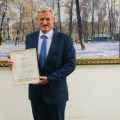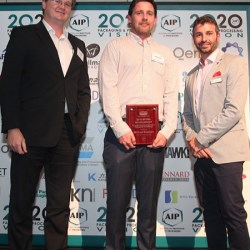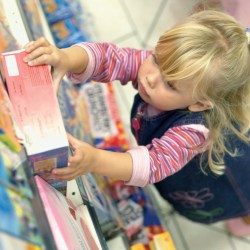If this is your company, CONTACT US to activate Packbase™ software to build your portal.
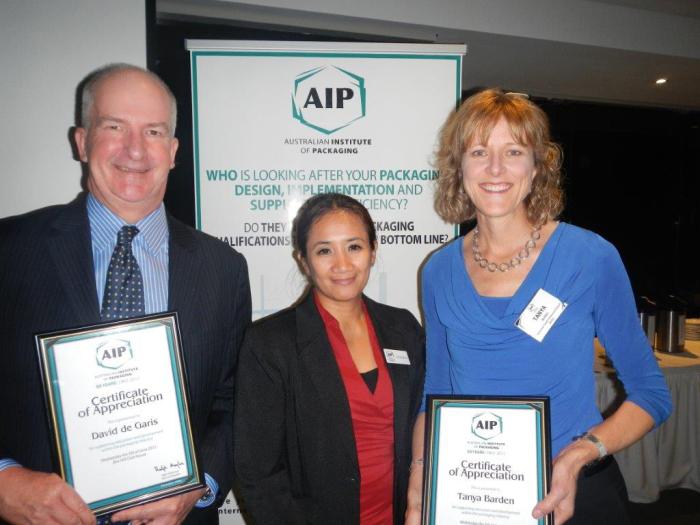

Generally the theme of a meeting is around one discipline but when eminent presenters come to discuss the "Outlook for Australian Business after the Resources Boom" and the "Future of Packaging White Paper" a whole gamut of topics comes under consideration.
David de Garis Director and Senior Economist National Australia Bank (NAB) and Tanya Barden Director of Sustainability, Trade and Innovation at Australian Food and Grocery Council (AFGC) were the two experts who delivered many thought provoking snippets.
David de Garis said at the very start of his address "we live in interesting times" and then went onto openly address the changing landscape in the resources industry and the political arena. He noted quickly changing sands over the past twelve months in the mining industry with the "red hand" of down-down being prominent over the period. Many investments have been delayed or abandoned and only those infrastructure projects beyond tipping point will be completed.
Easy to understand when the spot price for iron ore has dropped by $79.00 a tonne but costs of production remain high. A projection is that mining profitability is below average and will remain so until Q3 of 2014. Coal companies’ striving to maintain a reasonable return on investments [ROI], are cutting staff and also like their counterparts in iron ore and other resources are shutting marginal production sites and advising of profit downgrades.
But all is not written in red ink! The Chinese economy is maturing but the changed socio-economic delivers some positive outlooks for Australian industries that can fill the demand. Wine, meat and dairy products are growing unabated with 25 million new customers, but all are commodities where global competition for the markets is severe.
Turning to the domestic situation we heard that many high value projects [instance AUD$2 billion for new Adelaide hospital] are committed but there are a limited number of such domestic building projects. There is a squeeze on household spending and debt to income is still high. This belies the spin that Governments say about the local economy. The long time to the election is draining business confidence but there is no doubt that the winner will be poor. Housing affordability is still difficult and there is little demand for commercial properties.
An unconsidered import was uncovered when David discussed the Australian dollar. Because Japan and USA have been printing money in what is called quantitative easing the rate of exchange has fluctuated wildly. Mr de Garis declared it to be a "volatile beast" that is expected to drop to 94 cents against the US$.
Some discussion arose about the export of LNG and the impact on Australian Industry. America will become more competitive when LNG ships can pass through the Panama Canal but support for home manufacturing was uncovered. In USA, industry pays a quarter of the price paid by Asian customers but although price comparisons were not discussed it is considered that our local gas prices could in an oft used term be classed as "gouging". The assistance to Australian manufacturing is solely in the hands of the Government regulators. America is now able to compete against Asia and Mexico for manufacturing.
The positive for packaging companies lies with transport both domestic and export as all unitised commodities need to be packaged before they can be transported.
The Australian Food and Grocery Council (AFGC) is the leading national organisation representing Australian food, drink and grocery manufacturing industry.
The membership of AFGC comprises more than 150 companies, subsidiaries and associates which constitutes in the order of 80 per cent of the gross dollar value of the processed food, beverage and grocery products sectors.
With an annual turnover in the 2010-11 financial year of $110 billion, Australian food and grocery manufacturing industry makes a substantial contribution to the Australian economy and is vital to the nation's future prosperity.
But the stories told by Tanya Barden were far from rosy. On the day that a major food canning operator was considering closure which follows on a number of others recently the word tough did not go unnoticed. Coincidentally gas prices are a major issue for manufacturers and although only seven companies are eligible to pay the carbon tax there is no ability to pass on the additional costs. Cost of water and waste disposal are also high impact inputs.
Add to this severe retail competition, which is squeezing supplier margins and increased import competition. AFGC acknowledges that the retail conditions are tough but champions local clean and green food processed and packaged here.
AFGC has made a submission on the Packaging Impacts Decision Regulation Impact Statement (PIDRIS). The AFGC is a member of the National Packaging Covenant Industry Association (NPCIA) and accordingly is supportive of their submission on this issue. The thrust of PIDRIS is to further regulate packaging and littering which places AFGC in the ring against consumer activists and the often unbelievable decisions by Government committees. (David de Garis mentioned the live cattle export debacle.)
The proponent of scrapping or weakening the APC and introducing nationwide Container Deposit Legislation [CDL] is a major battle to be fought. Another option being considered by governments would involve keeping the APC but significantly increasing industry contributions to $40- $50 million – yet another impost in tough economic times! AFGC is working hard to get all member companies to sign onto APC and increase the percentage of recycling. But the battle is being fought in tandem with changing society demand and Government requirements, which as expected; are not the same in every state of this federation!
Tanya delayed her travel to the AIP meeting, as earlier AFGC, Coles and the RED Group launched a soft plastics recycling program in Canberra on World Environment Day.RED Group programs are well known to AIP members as we have supported Director Liz Kasell and the recycling company Replas. The RED Program is a true product stewardship model where everyone involved in the life cycle of a product, including manufacturers, distributors and consumers have a responsibility for that product throughout its entire life cycle, including its end-of-life outcome. Many other positive programs are in train at AFGC and are detailed on the organisation’s web site.
David de Garis told us that finance is a volatile beast but was cautious about Government involvement however Tanya left us with the thought "Governments will withdraw from funding but increase the impost on industry".
The evening came to a close with a spirited question time where Government policies and manipulation of statistics was vocally advanced. The major grocery retailers by price reductions on staples that are part of the Consumer Price Index assist the spin merchants at Canberra but not the manufacturers making those goods.
Both presenters were thanked by Llew Stephens and gifted with a bottle of wine that will be one less exported to China.


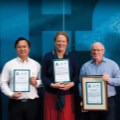
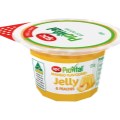

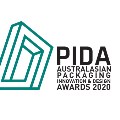
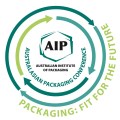
.jpg)



